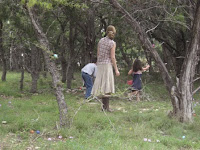Writers love analogies. And we
really love analogies about writing. Some days, it seems like every other blog post out there ends with a comparison of how the day's topic compares to the writing process. I did one on
shoes not too long ago.
In my past life (meaning the era before I chucked my career to write full time) I was a recipe developer, working in the test kitchen of a food manufacturer. This also happens to be the job of Lara, my MC in THE SHADOW SCRIBE. As I was revising, I came upon this passage, something Lara says while working:
Recipe development is not a job with immediate gratification. Some projects – like this one – take me five, ten, even twenty tries to get the recipe perfect.
So of course, that got the analogy juices flowing. Let me tell you how recipe development works:
You start with an ingredient (usually a product made by said company). And then you come up with a target recipe. You write out a version of the recipe using the necessary ingredient and then you make the recipe. And you taste it. And you change a few ingredients. And then you make it again. And adjust a few more things. And then you make it again. And taste it again.
By now, you are getting tired of the taste and you are losing your objectivity. So you have a few other people taste it. They give you their opinions; some think it needs more salt, some think it needs less. So you change it again. And you taste it again. You start to think you never want to taste that recipe ever again. But you must, because it is your job, you've worked hard on it, and you are a professional. You remake and retaste a few more times until you think it is perfect.
When you are confident it is finished, you serve it up to the VIPs (usually sales and marketing types). Sometimes they say it isn't quite what they are after (at which point you go back and rework and retaste a few more times). And sometimes, their eyes glaze over, they make yummy noises, and they eat the whole thing. Score.
I'm not going to draw the writing/editing analogy for you -- you are a bright group and I'm sure you'll figure it out.
So that is my "_______ is like writing" analogy.
Let's have a contest (my first ever)! In the comment section, give me your best/most obscure/most ridiculous "_____ is like writing" analogy. If you've already posted an analogy on your own blog, link to it. If you've seen someone else with a great analogy, link to that. If you don't have an analogy, comment anyway. I get lonely over here sometimes.
For anyone who comments or links, I'll throw your name in a hat for a $5 gift card for Starbucks (yeah, it's a small prize but, heck, every writer could use coffee, tea or a muffin). There's an extra entry for anyone who makes a "Writing is like Starbucks" analogy or who mentions this contest on their blog. You've got until Thursday, April 29 to enter.
Come on... you're a writer! I know you've got an analogy floating around there somewhere!





